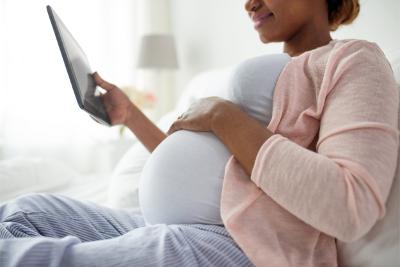Research into the efficacy of pregnancy apps as baby boom predicted

A paper by OU researchers which questions the efficacy of pregnancy apps just as experts predict a baby boom, is published in the British Medical Journal Sexual & Reproductive Health this week (6 April 2020).
Dr Sarah Earle, Director of the OU’s Health & Wellbeing Strategic Research Area, led a scoping review: Use of menstruation and fertility app trackers: a scoping review of the evidence, which examined 654 records around women’s use of apps which track menstruation and fertility.
The scoping review, which according to the researchers, is the first ever non-commercially funded review of this size which reviews popular fertility and pregnancy planning apps, reveals:
- The number of such apps is large, they are growing, and they are increasingly popular
- There is enormous variation in the types of apps available, ranging from very simple diaries through to apps that use complex, sometimes proprietary, algorithms to determine ovulation and fertility windows
- A survey of 1000 women indicates that nearly 80% of women intend to use a fertility tracker app in the future
- There is a growing evidence base that some apps are useful to women who do not want to rely on hormonal methods of contraception or do not want to use condoms; this poses the risk of unintended pregnancy
- While there are many apps available for download there is little discussion surrounding the regulation of fertility and menstruation app
“While in coronavirus lockdown, people are using technology more and may not be picking up contraceptives in an ad hoc manner during trips to the supermarket and as a result they may think that they can rely on these apps for contraception, when in reality, there is only one app on the market which has certification,” said Dr Earle. “What is really alarming is that we know anecdotally that women are getting pregnant as a result of using these apps which are not designed as contraceptives.”
The full list of authors of the paper: Use of menstruation and fertility app trackers: a scoping review of the evidence are: Dr Sarah Earle, Dr Hannah Marston, Research Fellow in the Health & Wellbeing Strategic Research Area, Dr Robin Hadley, Independent Researcher, Manchester, and Dr Duncan Banks, Lecturer in Biomedical Science, OU Faculty of Science, Technology, Engineering & Mathematics.
Contact our news team
For all out of hours enquiries, please telephone +44 (0)7901 515891
Contact detailsNews & articles

Open Research Week to spotlight innovation in 2026
Open Research Week will return from 16–20 March 2026, uniting Open University researchers and partners to explore how open practices drive engagement, innovation and societal benefit.